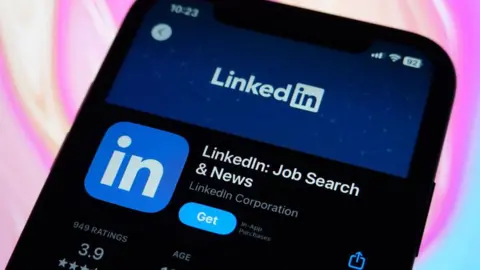 Getty Pictures
Getty PicturesProfession-networking web site LinkedIn has advised Australian lawmakers it’s too uninteresting for youths to warrant its inclusion in a proposed ban on social media for below 16 12 months olds.
“LinkedIn merely doesn’t have content material fascinating and interesting to minors,” the Microsoft-owned firm stated in a submission to an Australian senate committee.
The Australian authorities has stated it will introduce “world-leading” laws to cease youngsters accessing social media platforms.
However firms behind among the hottest platforms with younger folks – Meta, Google, Snapchat-owner Snap Inc and TikTok – have all challenged the deliberate legislation in submissions made to lawmakers.
Prime Minister Anthony Albanese has stated the proposed legislation is to handle the hurt social media was inflicting on Australian youngsters.
He stated it was for “the mums and dads” who like him had been “apprehensive sick in regards to the security of our youngsters on-line.”
Different nations are intently watching what occurs with the laws with some – together with the UK – saying they’re open to following go well with.
Australia’s Senate Surroundings and Communications Laws Committee gave respondents someday to touch upon the invoice, which might amend its current On-line Security Act.
Its report back to the Senate concludes the invoice ought to move – offering its suggestions, akin to partaking younger folks within the laws’s implementation, are thought of.
‘Vital issues’
Nonetheless, of their responses, the world’s greatest tech corporations have been setting out why they’re sad with the proposed legislation.
Google – which owns YouTube – and Instagram-parent Meta have stated they wanted extra time to think about the laws.
Meta stated its present kind “will fail to realize its purpose of decreasing the burden on mother and father to handle the protection of younger folks on social media”.
It additionally claimed it “ignores the proof” offered by little one security and psychological well being specialists – a view shared by Snapchat in its personal submission.
X (previously Twitter), in the meantime questioned the legality of the invoice’s proposals.
TikTok Australia stated it had “vital issues” with the invoice as proposed.
Like different platforms commenting on the laws, it stated it “hinges” on an ongoing age assurance trial taking a look at applied sciences that may successfully test person age.
Ella Woods-Joyce, director of public coverage for TikTok Australia and New Zealand, wrote within the firm’s submission that the invoice’s “rushed passage poses a severe threat of additional unintended penalties”.
However LinkedIn has adopted a special method – arguing in its submission that may be a platform which is just not of any curiosity to youngsters.
Its minimal age requirement of 16 means they can not entry it, the corporate stated, including it removes little one accounts when discovered.
If LinkedIn can efficiently argue it shouldn’t be included within the laws it’s going to doubtlessly keep away from the fee and disruption concerned it introducing further age verification processes to the location.
“Subjecting LinkedIn’s platform to regulation below the proposed laws would create pointless boundaries and prices for LinkedIn’s members in Australia to undertake age assurance,” it stated.
Curiosity elsewhere
The Australian authorities has stated it needs to herald the laws earlier than the top of the parliamentary 12 months.
However specialists have stated the invoice’s timeframe and present composition fails to offer a possibility for enough scrutiny.
Carly Type, the nation’s privateness commissioner, stated in a LinkedIn put up on Monday after showing at a public Senate listening to that she was involved by “the widespread privateness implications of a social media ban”.
Human rights commissioner Lorraine Findlay referred to as the one-day window for submissions of responses to the laws “completely insufficient” in a LinkedIn put up on Thursday.
“We want precise session, not simply the looks of it,” she stated.
Nonetheless, the Australian authorities’s plans have sparked curiosity elsewhere.
Within the UK, the know-how secretary, Peter Kyle, advised the BBC this month that comparable laws was “on the desk.”
France has already launched laws requiring social media platforms to dam entry to youngsters below 15 with out parental consent- although analysis signifies nearly half of customers had been in a position to circumvent the ban utilizing a easy VPN.




